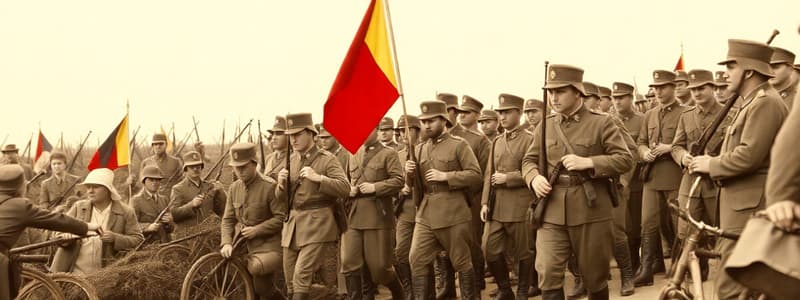Podcast
Questions and Answers
România a intrat în Primul Război Mondial pe 27 august 1916, alături de Puterile Centrale.
România a intrat în Primul Război Mondial pe 27 august 1916, alături de Puterile Centrale.
False (B)
Aceasta s-a bazat pe aspirațiile naționaliste, România dorind să unească populațiile românești din diferitele teritorii austro-ungare.
Aceasta s-a bazat pe aspirațiile naționaliste, România dorind să unească populațiile românești din diferitele teritorii austro-ungare.
True (A)
România nu a suferit pierderi territoriale semnificative în urma conflictului.
România nu a suferit pierderi territoriale semnificative în urma conflictului.
False (B)
Ofensiva română din 1916 a avut succes inițial dar a fost rapid contracarată de Puterile Centrale.
Ofensiva română din 1916 a avut succes inițial dar a fost rapid contracarată de Puterile Centrale.
Guvernul și conducerea militară română au fost lăudați pentru strategia lor eficientă în timpul războiului.
Guvernul și conducerea militară română au fost lăudați pentru strategia lor eficientă în timpul războiului.
Regele Ferdinand I a fost complet neimplicat în deciziile militare care au dus la retragerea României.
Regele Ferdinand I a fost complet neimplicat în deciziile militare care au dus la retragerea României.
După război, România a câștigat teritorii în Transilvania, Bucovina și Banat.
După război, România a câștigat teritorii în Transilvania, Bucovina și Banat.
Tratatul de la Trianon a fost o înțelegere care a contestat controlul României asupra anumitor teritorii.
Tratatul de la Trianon a fost o înțelegere care a contestat controlul României asupra anumitor teritorii.
Campania românească a avut un impact limitat asupra strategiei Aliaților pe Frontul de Est.
Campania românească a avut un impact limitat asupra strategiei Aliaților pe Frontul de Est.
Coordonarea contrasarcinilor în campanie a fost realizată de figuri din națiuni precum Germania și Austro-Ungaria.
Coordonarea contrasarcinilor în campanie a fost realizată de figuri din națiuni precum Germania și Austro-Ungaria.
Flashcards
Responsabilitatea pentru înfrângerea românească
Responsabilitatea pentru înfrângerea românească
Regele Ferdinand I și conducerea militară românească au fost considerați parțial responsabili pentru strategia militară defectuoasă și deciziile care au condus la înfrângeri grave în timpul campaniei și la retragerea finală.
Câștigurile teritoriale ale României
Câștigurile teritoriale ale României
După pierderile inițiale, România a câștigat teritorii semnificative în Transilvania, Bucovina și Banat după război.
Tratatele de pace și controlul românesc
Tratatele de pace și controlul românesc
Tratatele de pace de după război, cum ar fi Tratatul de la Trianon, au recunoscut controlul românesc asupra acestor teritorii și au consolidat și mai mult poziția sa în regiune.
Impactul prăbușirii României
Impactul prăbușirii României
Signup and view all the flashcards
Lecții din campania românească
Lecții din campania românească
Signup and view all the flashcards
Intrarea României în Primul Război Mondial
Intrarea României în Primul Război Mondial
Signup and view all the flashcards
Ofensiva inițială românească
Ofensiva inițială românească
Signup and view all the flashcards
Contraofensiva Puterilor Centrale
Contraofensiva Puterilor Centrale
Signup and view all the flashcards
Consecințele războiului pentru România
Consecințele războiului pentru România
Signup and view all the flashcards
Frontul românesc
Frontul românesc
Signup and view all the flashcards
Study Notes
Romanian Participation in World War I
- Romania joined the Allied forces on August 27, 1916, primarily driven by territorial ambitions, aiming to unite Romanian populations in Transylvania, Bukovina, and Banat.
- Initial Romanian advances into Transylvania were successful, but the Central Powers (Germany and Austria-Hungary) launched a powerful counter-offensive.
- The Central Powers' offensive was swift and overwhelming, pushing Romanian forces back due to superior numbers and equipment.
- Factors contributing to the Romanian army's retreat included poor military preparedness, logistical problems, inadequate Allied support, and an underestimation of the Central Powers' strength.
Causes of Romanian Involvement
- Romanian nationalism fueled its involvement, desiring to unite Romanian populations under one nation, a goal known as the "Great Union" (Marea Unire).
- The war presented an opportunity to acquire these territories, seen as a crucial step towards achieving this national unity.
- Romania hoped for support from its Allied partners, especially Russia, to secure its territorial objectives.
Course of the War on the Romanian Front
- Romania's 1916 offensive saw initial success, but was countered by a concerted Central Powers' counterattack.
- The German-led offensive forced a rapid Romanian retreat, resulting in significant territorial losses and a setback for the Allies on the Eastern Front.
- Romanian leadership faced criticism for strategic missteps and miscalculations, further hindering their position.
Consequences and Impact
- Romania suffered considerable territorial losses and substantial military casualties.
- The war effort severely damaged Romania's economy and infrastructure, causing widespread civilian hardship.
- Allied supply lines were disrupted, impacting the ability to support Romanian troops.
- The military and economic consequences led Romania to seek negotiation and diplomatic solutions.
Role of Key Figures
- King Ferdinand I and the Romanian military leadership were partly blamed for poor strategy and decisions, impacting the campaign's outcome.
- German and Austro-Hungarian leaders played key roles in coordinating the successful counteroffensive.
Territorial Changes Post-War
- Despite initial losses, Romania gained significant territories in Transylvania, Bukovina, and Banat after the war.
- Post-war peace treaties, such as the Treaty of Trianon, officially recognized Romanian control over these territories, solidifying their position.
Impact Beyond Romania
- Romania's swift collapse influenced Allied strategy on the Eastern Front, highlighting the challenges and uncertainties of the war.
- The Romanian campaign emphasized the importance of effective military strategy and cooperation among allies in achieving shared goals, exposing complexities and vulnerabilities in the war effort.
Studying That Suits You
Use AI to generate personalized quizzes and flashcards to suit your learning preferences.
Description
Acest quiz explorează implicarea României în Primul Război Mondial, inclusiv motivele naționaliste din spatele intrării în război. Participarea României pe partea Aliaților a fost marcată de succese inițiale, urmate de o contraofensivă devastatoare din partea Puterilor Centrale. Află mai multe despre provocările și cauzele acestei implicări istorice.




